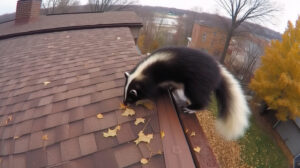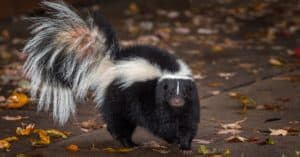If you live in Canada, South America, Mexico, or the United States, you’re probably familiar with skunks. Twelve species of this adorable but pungent animal roam the earth, and most of them are native to North and South America. One old-world relative, the Sunda stink badger (Mydaus javanensis), makes its home in Indonesia, Malaysia, and the Philippines. Regardless of where you’re from, you’re likely familiar with the reputation of the skunk. This is due to the interesting – and infamous – defense mechanism that this furry critter has developed.
Skunks are capable of ejecting secretions from their anal glands to ward off predators. They can spray this foul-smelling secretion up to fifteen feet from their bodies! Today, we’ll be learning about this incredible animal’s eating habits. Specifically, we wanted to know what skunks do during the colder seasons. If you asked, “What do skunks eat in the winter?”, you came to the right place. We have your answers.
Do Skunks Hibernate?
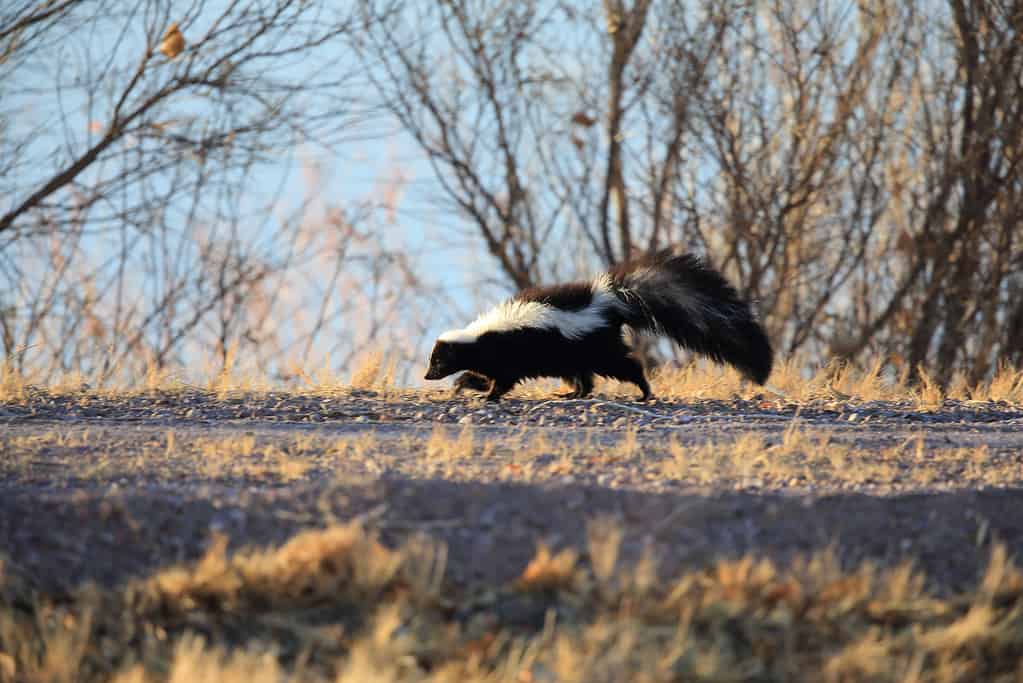
Striped skunks (
Mephitis mephitis)are one of the most common species of skunk in the United States.
©Frank Fichtmüller/iStock via Getty Images
Unlike many other furry mammals, skunks do not hibernate. However, they do become significantly less active in the cold season and they spend a lot of time in their underground winter dens. They sometimes even enter a deep resting state called “torpor”. However, they can be highly active during the winter season, too, and they do not store food like other wintering mammals. This means that they have to be prepared for the impending season.
Preparations for the cold season include building a den and bulking – skunks eat a lot of food to pack on fats to survive the winter. Since they do not enter full hibernation, they still need a food source outside of their fat reserves.
Skunk Diet
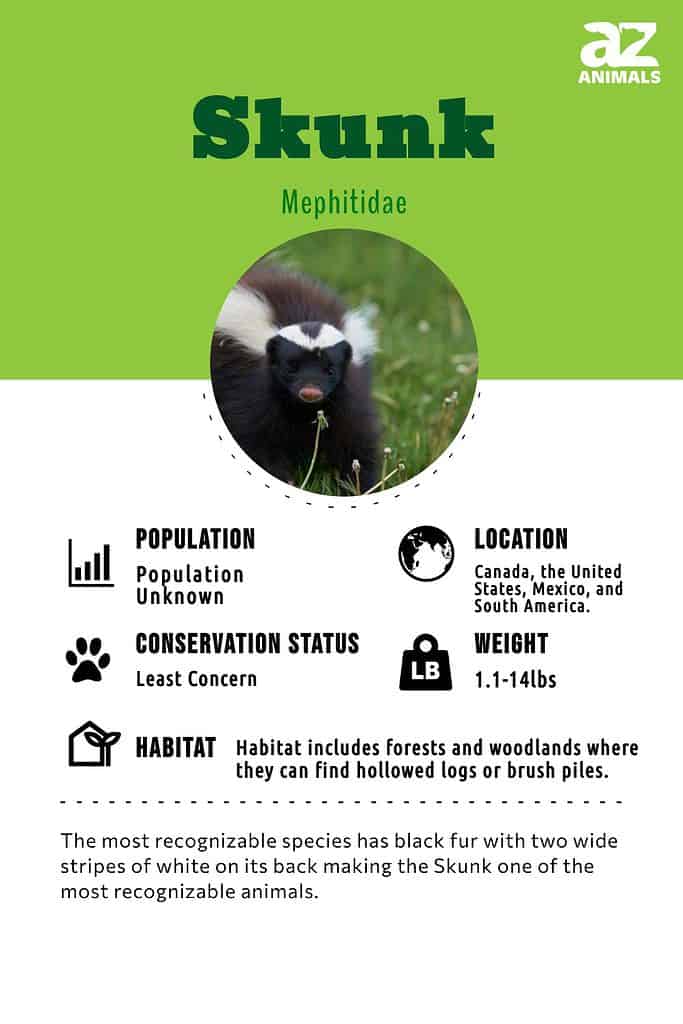
Skunks are opportunistic omnivores, which means they have a very adaptable diet. This is imperative for the survival of the species – food sources change over seasons and a skunk’s ability to adapt directly impacts its survival rate. In urban areas, they are well-known to eat anything they can find – even if it means digging through your garbage. This is especially true in winter months when the pickings are more scarce. All year round, skunks prefer foods that are high in fats and dense in calories. Their summer diet is vast and rich, but winter scarcity makes them even less picky about their meals. Let’s take a look at some of the food skunks eat in the winter.
What Do Skunks Eat in the Winter?
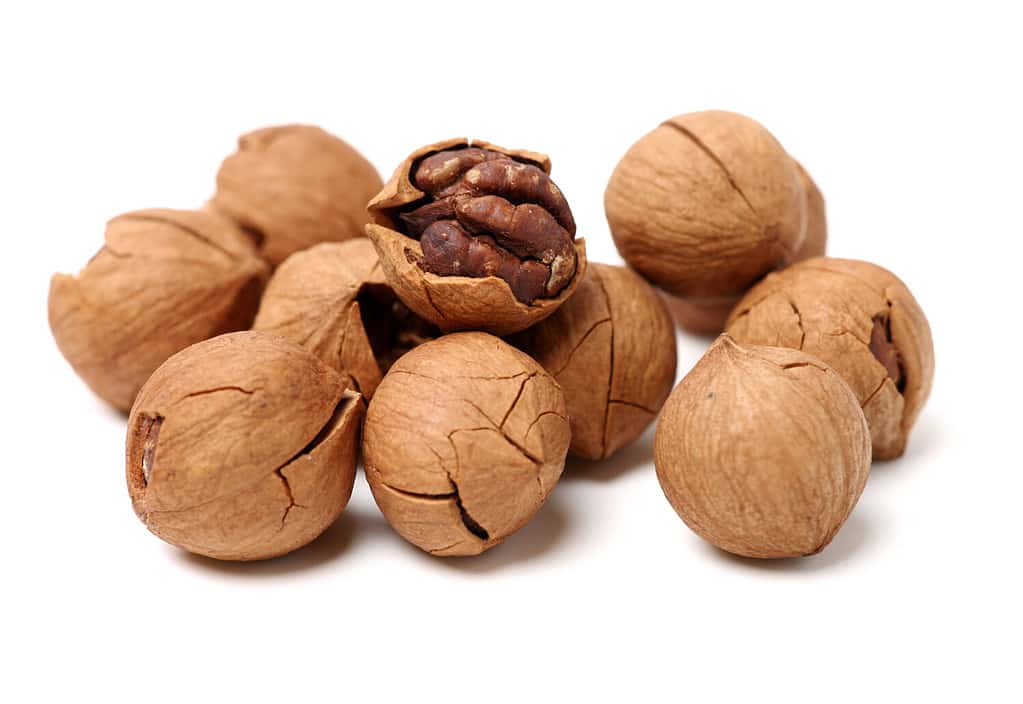
Hickory nuts are a common winter staple for our furry friends.
©JIANG HONGYAN/Shutterstock.com
As we said before, skunks are opportunistic in their diets. This is especially true in the scarcity of winter, and they are forced to spend more time scavenging or foraging for their meals. They don’t like to go too far from their dens, so their diet is based almost completely on nearby availability. Skunks do hunt, but their diet consists more of scavenging and foraging in winter months than hunting. This means their diet will often be more lean in the winter than in warmer months, consisting more of fruits, veggies, and berries. Let’s look at some common winter food sources.
Berries
Berries are a common part of the skunk diet all year round, but especially in winter. Elderberries, wild grapes, cranberries, winterberries, chokeberries, and mountain ash are all common staples.
Nuts and Seeds
Since skunks don’t hunt as much during the winter, they still need a good source of protein and vitamins. Nuts and seeds often have a good nutritional value and are very high in fat content, which is perfect for wintering. Pecans, sunflower seeds, birdseed, hickory nuts, walnuts, and almonds are all good examples.
Meat and Carrion
Skunks prefer to scavenge in the winter. Hunting takes up a lot of energy, as there are few to no insects, and many small mammals are also tucked away in the winter. However, skunks will still hunt for some small nesting mammals, especially if the pickings are easy. These mammals include moles and mice but extend to chipmunks, voles, and rats. They also scavenge for carrion – carcasses left behind by other animals.
Grain, Plants, and Corn
If corn or grains are easily available, a skunk will not hesitate to eat them. Wheat, oats, barley, rice, sweet corn, field corn, soybeans are all acceptable for the wild skunk. Some dead plant matter is also a food source, as well as the roots and leaves of many edible plants. Even some varieties of grass – fresh or dormant – can offer nutrition to a skunk.
Garbage and Pet Food
In more urban settings, the winter diet of the skunk expands to any leftovers from your table. Much like raccoons, skunks will happily dig through your bins for compost and food scraps. They’ll also happily consume pet food that is left out.
Winter Diet vs. Summer Diet
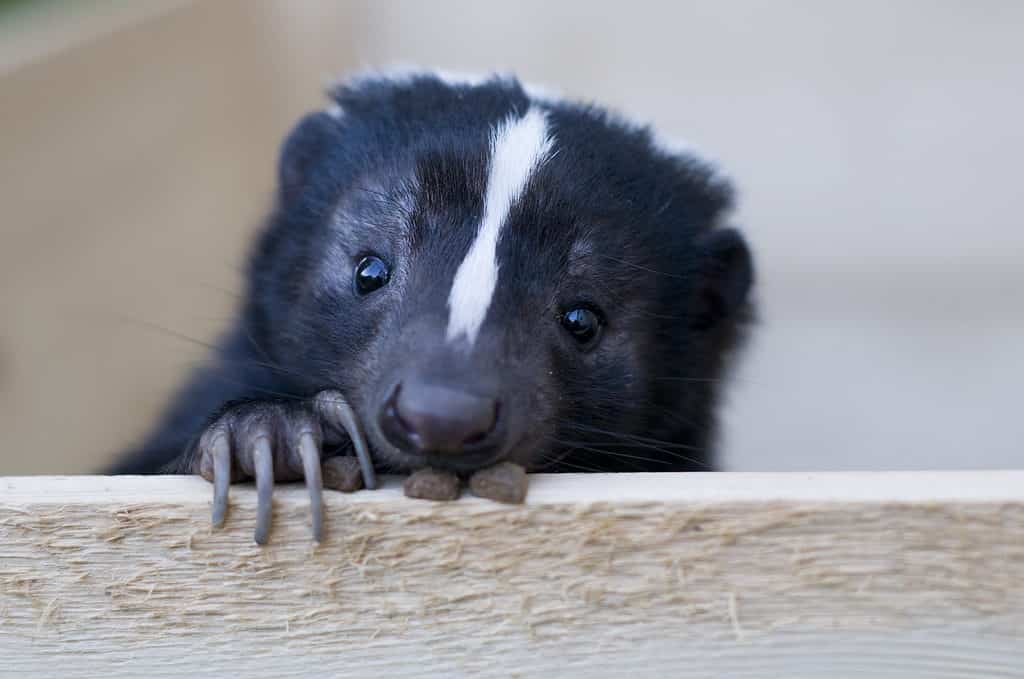
Skunks have a leaner diet in the winter vs. what they eat in the summer.
©Yasmins world/Shutterstock.com
Winters are often a lot leaner for this species. A large portion of primary food sources for wild skunks disappears in the winter. We’ve compiled a short list of foods that are mostly only available to skunks in the summer months. The major difference between a summer diet and a winter diet is meat and insect consumption. Summer months make many of these food sources significantly more available.
- Salamanders, frogs, snakes, and lizards
- Bees and wasps, especially honeybees
- Grubs and insect larvae
- Fish
- Insects and beetles, such as crickets and caterpillars
- Bird eggs and young hatchlings
- Rodents, such as mice, shrews, and voles
The diet of this interesting mammal is based on need and availability. Skunks spend the warmer months bulking up while food is highly available and rich in fats and calories. Their diet adjusts to winter scarcity and becomes more lean. With the stored fat from the summer and the lower winter activity levels, skunks can easily survive these dietary changes and make it through the cold season.
The photo featured at the top of this post is © bobloblaw/iStock via Getty Images
Thank you for reading! Have some feedback for us? Contact the AZ Animals editorial team.




